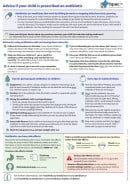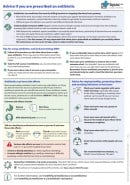You can now add Healthify as a preferred source on Google. Click here to see us when you search Google.
Roxithromycin
Sounds like 'rox-ith-roh-my-sin'
Key points about roxithromycin
- Roxithromycin is an antibiotic used to treat different infections caused by bacteria.
- Like all antibiotics, roxithromycin is not effective against infections caused by viruses.
- Find out how to take it safely and possible side effects.

Roxithromycin is an antibiotic used to treat infections such as infections of the chest, tonsils, skin or genitals. It works by killing or stopping the growth of bacteria (bugs). Like all antibiotics, roxithromycin is not effective against infections caused by viruses.
In New Zealand, roxithromycin is available as tablets (150 mg and 300 mg).
- Always take your roxithromycin exactly as your doctor has told you. The pharmacy label on your medicine will tell you how much to take, how often to take it, and any special instructions.
- The dose of roxithromycin will be different for different people depending on the type of infection.
- The usual dose in adults is 300 mg once a day OR 150 mg twice a day.
- Your doctor will advise you how long to take roxithromycin for (usually 5 to 10 days).
- Timing of your dose: Roxithromycin is best taken on an empty stomach, about 15 minutes before food or 3 hours after food. If it makes you feel sick, then take it with food. Take roxithromycin at the same time each day. Swallow the tablets whole with a glass of water.
- Missed dose: If you forget to take your dose, take it as soon as you remember. But if it is nearly time for your next dose, just take the next dose at the right time. Don't take double the dose.
Here are some things to know when you're taking roxithromycin. Other things may be important as well, so ask your healthcare provider what you should know about.
- Roxithromycin doesn't have a direct interaction with alcohol. This means that most people could have the occasional drink while taking it without any serious problems. However, if roxithromycin makes you feel sick (nausea), don't drink alcohol as it will make you feel worse.
- If you are taking the contraceptive pill, you don't usually need to use additional contraception if you're taking roxithromycin. But if the antibiotic or the illness they're treating cause diarrhoea or vomiting, lasting more than 24 hours, absorption of the contraceptive pill may be affected. If this happens, ask your prescriber for advice about contraception over the following few days.
Like all medicines, roxithromycin can cause side effects, but not everyone gets them. If you're concerned about any symptoms you think might be related to your medicine, talk to your healthcare provider. The following information offers some guidance but doesn't include all possible side effects.
Common side effects
Tell your healthcare provider if these side effects bother you.
- A sore stomach, feeling bloated, gas in the tummy or nausea (feeling sick): Try taking your roxithromycin with food.
- Vomiting (being sick) or diarrhoea (runny poo): Tell your healthcare provider if your diarrhoea is severe, contains blood or lasts more than a few days. If you have a lot of diarrhoea or have been vomiting and you're taking the oral contraceptive pill, let your healthcare provider know.
- Not feeling hungry.
- Feeling dizzy: Avoid alcohol, as it can make dizziness worse. Wait until you know how the medicine affects you before driving or using machinery.
- Small white patches in your mouth or a white furry tongue (oral thrush): Ask your healthcare provider for advice.
- Vaginal itching, soreness or discharge (vaginal thrush): Ask your healthcare provider for advice.
Tell your healthcare provider immediately or phone Healthline free on 0800 611 116 if these occur
- Fainting or feeling like your heart is beating too fast.
- Problems with your hearing.
- Signs of problems with your liver such as yellowing of the skin or eyes, dark urine, pain in the tummy.
Phone 111 for an ambulance or go to your nearest accident and emergency (A&E) clinic if these occur
- Signs of an allergic reaction such as itchy skin, and rash, swollen lips or tongue, problems breathing, like a tight chest or shortness of breath.
Read more about medicines and side effects and reporting a reaction you think might be a side effect.
The following links provide further information on roxithromycin:
Arrow-Roxithromycin(external link) Medsafe Consumer Information Sheet, NZ
Roxithromycin(external link) New Zealand Formulary Patient Information
Brochures
Advice if you are prescribed an antibiotic(external link) BPAC, NZ, 2024
Advice if your child is prescribed an antibiotic(external link) BPAC, NZ, 2024
Medicines and side effects(external link) Healthify He Puna Waiora, NZ, 2024
References
- Roxithromycin(external link) New Zealand Formulary
- Roxithromycin(external link) New Zealand Formulary for Children
Brochures

Advice if your child is prescribed an antibiotic
BPAC, NZ, 2024

Medicines and side effects
Healthify He Puna Waiora, NZ, 2024
Credits: Sandra Ponen, Pharmacist, Healthify He Puna Waiora. Healthify is brought to you by Health Navigator Charitable Trust.
Reviewed by: Angela Lambie, Pharmacist, Auckland
Last reviewed:
Page last updated:






